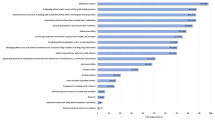Abstract
Aims
To investigate community pharmacists’ awareness, views and attitudes relating to independent prescribing by community pharmacists and their perceptions of competence and training needs for the management of some common conditions.
Setting
Community pharmacies in Scotland.
Method
A pre-piloted postal questionnaire was mailed to 500 randomly selected community pharmacies in Scotland for completion by the ‘main pharmacist’.
Main outcome measures
Scottish community pharmacists’ awareness, views and attitudes towards independent prescribing by community pharmacists; perceived competence and training needs in relation to diagnosis and treatment of conditions in four therapeutic areas; perceptions about patient accessibility to medicines and safety of independent prescribing by community pharmacists; and attitudes towards becoming an independent prescriber. The items regarding perceptions and attitudes were subjected to Principal Components Analysis (PCA) to identify the domains. Univariate analysis was performed on individual items in the questionnaire against total scores on the identified domains; significant variables in univariate analysis were further analysed in linear regression models.
Results
A response rate of 43.4% (217/500) was achieved. Despite expressing confidence in their abilities to become independent prescribers and feeling competent in diagnosing and treating those conditions listed in the questionnaire, clinical training prior to implementation of independent prescribing was regarded important by 211 (97.7%) respondents, while 191 (88.4%) regarded clinical training in drugs used for treating the conditions to be important. Gaining improved patient consultation skills and ability to communicate prescribing actions to GP practices were regarded to be important by 125 (57.9%) and 172 (80.0%), respectively. In PCA, three domains—confidence in independent prescribing, satisfaction with the␣current methods of supply, and requirements for the process of independent prescribing were identified. Practising more hours per week as a pharmacist (p = 0.01), supplementary prescribing training (p = 0.02), and involvement in Scottish Executive pharmaceutical care model schemes (p = 0.02), were found to be associated with greater ‘confidence in independent prescribing’.
Conclusion
High awareness of independent prescribing and perceived competence in diagnosing and selecting appropriate drugs for treating many common conditions were identified. Prescribing training with emphasis on evidence-based medicine, generic issues of prescribing and diagnostic and consultation skills is warranted before independent prescribing is undertaken by community pharmacists.
Similar content being viewed by others
References
Department of Health (1986) Neighbourhood nursing—a focus on care (The Cumberlege Report). HMSO, London
Crown J (1999) Review of prescribing, supply & administration of medicines. Final report. Department of Health, London
Supplementary prescribing (2004) Pharmacist practitioners. A guide for implementation within NHSScotland. Scottish Executive Health Department, Edinburgh
Medicines and Healthcare products Regulatory Agency (2005) Consultation on proposals to introduce independent prescribing by pharmacists. London
Foster A, Redmond S, Morgan G, Thorpe P (2002) Guidance on working patterns for junior doctors. Department of Health, National Assembly for Wales, NHS Confederation, British Medical Association
Department of Health (1994) The Medicinal Products: Prescription by Nurses, Midwives and Health visitors. Act 1992 (Commencement No. 1) Order 1994. HMSO, London
Department of Health (1998) Nurse prescribing: implementing the scheme across England. HMSO, London
Joint Formulary Committee (2004) British National Formulary, Vol 48. British Medical Association and Royal Pharmaceutical Society of Great Britain, London, ISBN: 0853695849
Department of Health (1998) Review of prescribing, supply and administration of medicines. A report on the supply and administration of medicines under group protocols. HMSO, London
The Health and Social Care Act 2001 (2001) 2000–2001 ed
Department of Health (2002) Groundbreaking new consultation aims to extend prescribing powers for pharmacists and nurses. HMSO, London
Bellingham C (2004) How supplementary prescribing is working for pharmacists in practice? Pharm J 273:2–3
Department of Health (2004) extending independent nurse prescribing within the NHS in England: a guide for implementation. HMSO, London
Department of Health (2005) Nurse and pharmacist prescribing powers extended. HMSO, London
Brooks N, Otway C, Rashid C, Kilty L, Maggs C (2001) Nurse prescribing: what do patients think? Nurs Stand 15(17):33–38
Stephenson T (2000) Implications of the Crown Report and nurse prescribing. Arch Dis Child 83(3):199–202
Horton R (2002) Nurse-prescribing in the UK: right but also wrong. Lancet 359:1875–1876
Aronson JK (2003) Nurse prescribers & reporters. Br J Clin Pharmacol 56(6):585–587
Hay A, Bradley E, Nolan P (2004) Supplementary nurse prescribing. Nurs Stand 18(41):33–39
Root G (2003) Supplementary prescribing—a groundbreaking opportunity. Pharm J 270:19–20
Child D, Hirsch C, Berry M (1998) Health care professionals’ views on hospital pharmacist prescribing in the United Kingdom. Int J Pharm Prac 6:159–169
Latter S, Maben J, Myall M, Courtenay M, Young A, Dunn N (2005) An evaluation of extended formulary independent nurse prescribing: executive summary of final report. University of Southampton
DeVellis RF (1991) Scale development: theory and applications. SAGE Publications, California, ISBN: 0803937768
Inch J, Bond MC, Lee AJ, Scott A, Grant AM (2005) Scottish community pharmacists’ current involvement in and attitudes towards ‘extended service’ provision: a national survey. Int J Pharm Prac 13:289–301
King RL (2004) Nurses’ perceptions of their pharmacology educational needs. J Adv Nurs 45(4):392–400
Akici A, Kalaca S, Ugurlu MU, Karaalp A, Cali S, Oktay S (2004) Impact of a short postgraduate course in rational pharmacotherapy for general practitioners. Br J Clin Pharmacol 57(3):310–321
Child D, Cantrill JA (1999) Hospital doctors’ perceived barriers to pharmacist prescribing. Int J Pharm Prac 7:230–237
Royal Pharmaceutical Society of Great Britain (2002) Outline curriculum for training programmes to prepare pharmacist supplementary prescribers. London
Acknowledgements
This study was supported by the School of Pharmacy, The Robert Gordon University. We acknowledge the input of final year pharmacy undergraduates—Denise Byrne, Susan Dunne and Lesley Williamson—to data collection and processing and Scott Cunningham, Lesley Diack, Kim Munro and Alison Strath for their input at various stages of this study.
Author information
Authors and Affiliations
Corresponding author
Rights and permissions
About this article
Cite this article
George, J., Pfleger, D., McCaig, D. et al. Independent prescribing by pharmacists: a study of the awareness, views and attitudes of Scottish community pharmacists. Pharm World Sci 28, 45–53 (2006). https://doi.org/10.1007/s11096-006-9018-6
Received:
Accepted:
Published:
Issue Date:
DOI: https://doi.org/10.1007/s11096-006-9018-6




